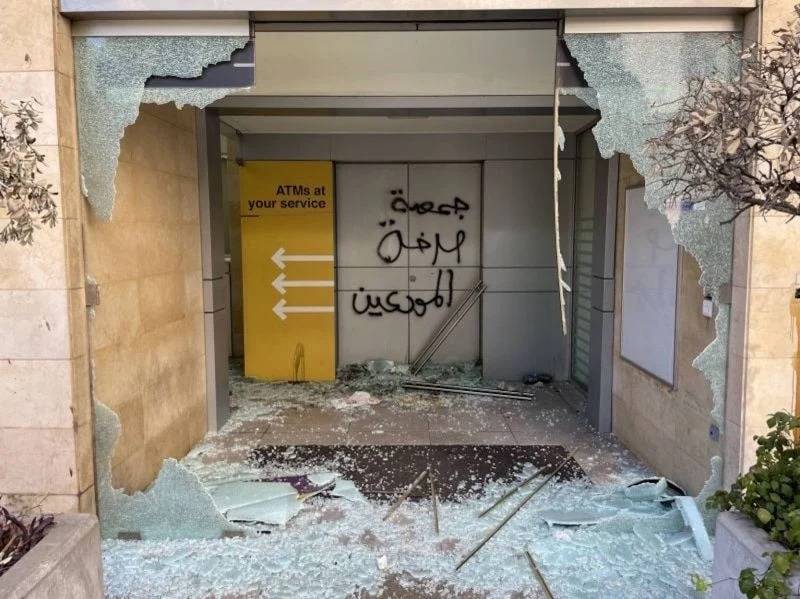
A bank vandalized by protesters. (Credit: Philippe Hage Boutros/L'Orient Today)
Want to get the Morning Brief by email? Click here to sign up.
Mount Lebanon Court of Appeal Public Prosecutor Ghada Aoun pressed charges of “money laundering” against Société Générale de Banque au Liban (SGBL) and its CEO Antoun Sehnaoui and ordered the seizure of their real estate and movable assets. Aoun’s indictment against SGBL and Sehnaoui follows an earlier threat of legal action against several banks asked to provide the account statements of their chairpeople, board members, auditors and supervisory committees. The heads of Bank Audi and Audi Group face similar charges. Yesterday, State Security, acting on instructions from Aoun, sealed a Bank of Beirut data center in Mansourieh just outside the capital, the bank's lawyer told L'Orient Today. SGBL refuted the charges in a statement yesterday claiming that Aoun is “working contrary to judicial laws and principles.” A legal representative of the Association of Banks in Lebanon told L’Orient Today that Aoun, facing several dismissal requests, should not be able to continue examining the case.
Supermarkets are expected to start displaying prices in dollars as of March 1, Supermarket Owners’ Union president Nabil Fahed told L’Orient Today. While the measure was expected to come into effect as of today, it was postponed due to the additional time needed to adapt supermarket computer systems, Fahed said. The measure, proposed at the start of this month, drew controversy, notably from labor union head Bechara Asmar who objected to it on grounds of “consumer protection” and taxation oversights. Caretaker Economy Minister gave the green light on the transition to dollarized pricing last week, also citing consumer protection after having postponed its implementation earlier in the month. Shoppers will have the option of paying either in dollars or in lira at the parallel market rate. However, products that suppliers charge in lira to supermarkets, such as produce, bread and cigarettes, will continue to be displayed in that same currency." The Central Administration of Statistics reported continued price increases in its monthly Consumer Price Index, noting an 11.29 percent increase in food and alcoholic beverage prices between January and December.
Mild earthquakes were reported across Lebanon yesterday and early this morning as a new report of damage related to the Monday evening tremor emerged. The National Center for Geophysics recorded a 4.3-magnitude quake off the coast of South Lebanon early Wednesday. And Tuesday, citizens in Akkar and North Lebanon felt a magnitude-4 earthquake that originated north of Latakia, Syria, after two mild magnitude-4 and a magnitude-3.5 earthquakes hit off the coast of Saida. A video of rocks obstructing a man’s house in Akkar after the 6.3-magnitude earthquake Monday evening was shared with L’Orient Today. Monday evening’s quake caused panic among residents across Lebanon, prompting some of them to leave their homes. Caretaker Interior Minister Bassam Mawlawi called earlier this month for municipalities to “carry out a survey of damaged buildings and landslides,” after the devastating earthquake in Turkey and Syria that killed more than 46,000 people.
A fire at a factory in Naameh, south of Beirut, killed one employee and injured several others. A short circuit is said to be the cause of the fire which briefly trapped employees inside the factory, the state-run National News Agency reported. One employee died after being transported to a hospital along with four other injured employees. An electrical short circuit is thought to have sparked an earlier fire last year at a carpet factory in Zefta, in the Nabatieh district, leading to millions of dollars in material losses. And a man was injured last December in Ain al-Rummaneh, just outside Beirut, after an explosion triggered by a short circuit.
In case you missed it, here’s our must-read article from yesterday: “State power isn’t keeping the lights on in Akkar: Can rooftop wind turbines take over?”
Compiled by Abbas Mahfouz